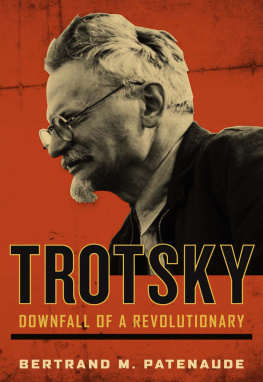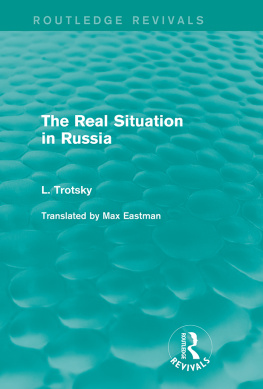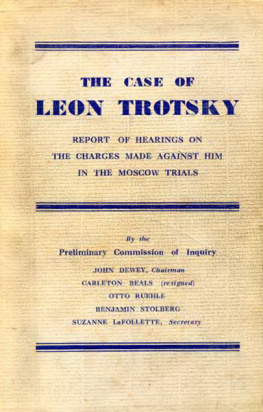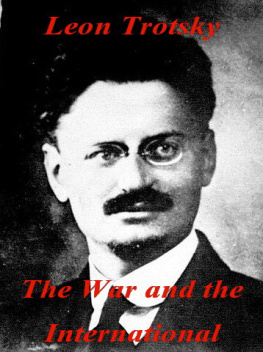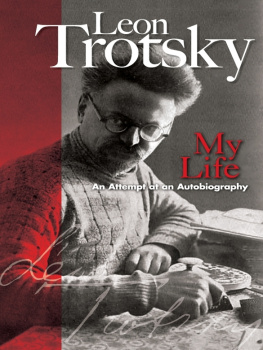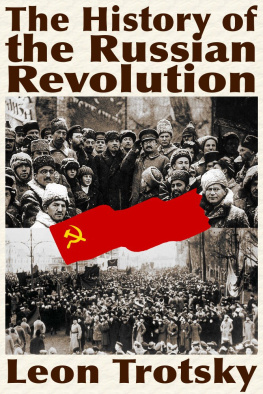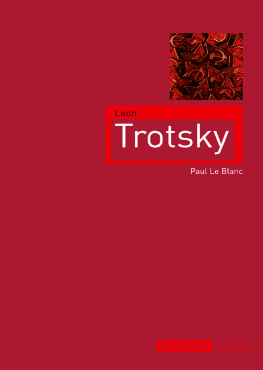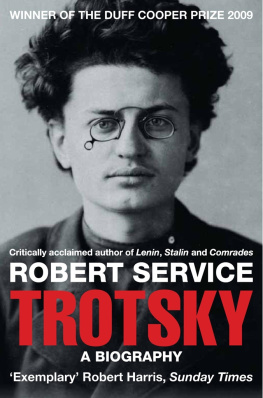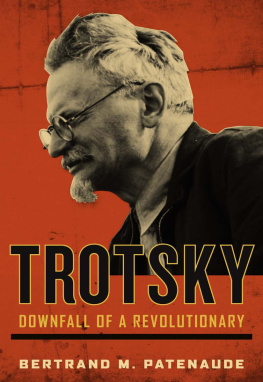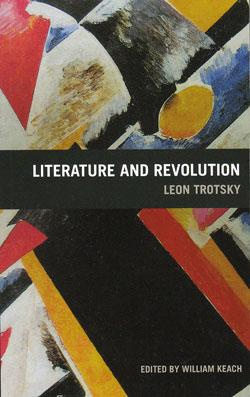Bertrand M. Patenaude
I n the early-morning hours of May 24, 1940, Leon Trotsky slept soundly inside his villa in Coyoacn, a small town on the southern outskirts of Mexico City. The house was heavily guarded. Five Mexican policemen occupied a brick casita on the street just outside the high walls of the property. Inside were Trotskys private bodyguards, five in all, including four young Americans. One of them, a twenty-five-year-old New Yorker by the name of Robert Sheldon Harte, started his shift that night at 1 a.m. posted inside the barred door to the garage, which was the only entrance to the house. His comrades were asleep in a row of outbuildings set against one of the inside walls of the roughly rectangular patio.
Trotsky had spent most of the previous day dictating a manifesto about the war in Europe and kept at it late into the evening. His major work in progress, a biography of Joseph Stalin commissioned by the New York City publishing house Harper & Brothers, was a year and a half overdue. The war was now a huge distraction, in part because of the bitterly divisive debates it had sparked among his followers in the United States, home to the most formidable of the Trotskyist splinter groups around the world.
Once the most internationally famous leader of the Soviet Union, Trotsky now made his living as a freelance writer. A literary stylist known for his sardonic wit, his most acclaimed work in the West was his panoramic history of the Russian Revolution, published in the early 1930s after he had been exiled by Stalin. He had agreed to write the biography of his archenemy only because he needed the money to support himself and to pay for his security in Mexico. The generous advance from the American publisher was long gone, but the book was nowhere near completion and had become a millstone around his neck. Trotsky often said to his wife, Natalia, that he had become disgusted with it and that he longed to return to writing his biography of Lenin.
Nor were Trotskys editors in New York especially pleased with the completed chapters. It had been a mistake to expect Trotsky to write an objective biography of the man who had destroyed him politically, wiped out his followers and his family, and transformed his image in the Soviet Union from a dashing hero of the Bolshevik Revolution into its Judas Iscariot. Trotskys name was readily invoked to account for every accident and failure in the USSR, from a train derailment, to a factory explosion, to a missed production quota. His theatrical appearancethe piercing gaze magnified by the thick lenses of his round glasses, the shock of turbulent hair, the thrusting goateeand his propensity for striking dramatic poses were a boon to the Soviet caricaturists. He was portrayed as several varieties of barnyard animal, including a pig branded with a swastika feeding at the trough of fascism, and in the title of a cartoon that exploited another favorite motif, The Little Napoleon of the Gestapo.
It is little wonder then that the Stalin biography had become a slog, and that the Second World War provided Trotsky with a good excuse to procrastinate. The war also gave him the opportunity to earn much-needed income by writing articles for American magazines about the latest diplomatic and military maneuvers. Trotskys appeal as an analyst of international affairs spiked in August 1939, when the world was stunned by the announcement of the Nazi-Soviet nonaggression pact, a turnabout he had predicted. What did the inscrutable, pipe-smoking Georgian dictator in the Kremlin have in mind when he signed a friendship treaty with his ideological opposite, Adolf Hitler? Trotsky was asked to assess the pact and then its bloody aftermath, as the Wehrmacht and the Red Army swallowed up Poland while the Kremlin asserted its mastery over Latvia, Lithuania, and Estonia, and then invaded Finland. Hitlers preoccupations were France and Great Britain, but it was only a matter of time, Trotsky confidently predicted, before the Fhrer would turn his armies eastward and invade the Soviet Union.
Stalins pact with Hitler forced the Soviet cartoonists to expunge the swastikas and the jackboots from their anti-Trotsky propaganda. Communist parties loyal to Moscow had to follow suit, among them the Mexican Communists, who were relentless in their efforts to compromise Trotskys asylum by portraying him as a meddler in Mexican politics. They had been banging this drum ever since his arrival in Mexico in January 1937, yet the anti-Trotsky campaign they launched in the winter of 193940 was more violent and sustained than any that had come before. Its slogan was a point-blank Death to Trotsky! And by the time the May Day marchers were shouting in unison for the traitor to be expelled, Trotsky had convened a meeting of his guards to warn them that his enemies were creating the atmosphere for an armed attack on the villa.
These threats put a strain on Trotskys nerves and his health. He was now sixty years old. He suffered from high blood pressure and insomnia, among other ailments. The best medicine was vigorous outdoor exercise. Trotsky loved to hunt and fish, yet the possibilities were limited in Mexico because of concerns for his safety. A picnic outing required the presence of several armed bodyguards and a detail of Mexican police.

Trotsky in the patio of his fortress, winter 193940.
Alexander H. Buchman Papers, Hoover Institution Archives
The Old Man, as his followers affectionately referred to Trotsky, adapted to his more restrictive environment by hunting for various species of cactus, which were transplanted to the patio in Coyoacn. These exhausting expeditions into the countryside were organized once every several weeks. Trotskys daily exercise these days revolved around his other new hobby, caring for the rabbits and chickens he kept in hutches and a caged yard in the patio. It was prison life, Trotsky often said, and his staff felt the same way. He chafed at his confinement and yearned to find an outlet for his restless energy. Adhering to routine, late in the evening of May 23 he had taken a sedative before going to bed.
A T ABOUT FOUR oclock in the morning the nighttime quiet was shattered by the sound of automatic gunfire. Summoned from a deep sleep, Trotsky thought he was hearing fireworks, that the Mexicans were celebrating one of their fiestas. Coming to his senses, he realized that the explosions were too close, right here within the room, next to me and overhead. The odor of gunpowder became more acrid, more penetrating. Clearly what we had always expected was now happening: we were under attack.
Natalia was quicker to react. She hustled Trotsky off his bed and onto the floor, sliding down on top of him and into a corner of the room. Gunfire came through the two doors facing each other on opposite sides of the room and through the French windows just above the couple, creating a three-way crossfire. As bullets ricocheted off the walls and the ceiling, Natalia hovered protectively over her husband until he communicated to her through whispers and gestures to lie flat next to him. Splinters of glass and plaster flew in all directions in the darkness. Where are the police? Trotsky wondered, his mind now racing: Where are the guards? Tied up? Kidnapped? Killed? And what had become of Seva? One of the rooms from which the gunfire came was the bedroom of the couples fourteen-year-old grandson.

